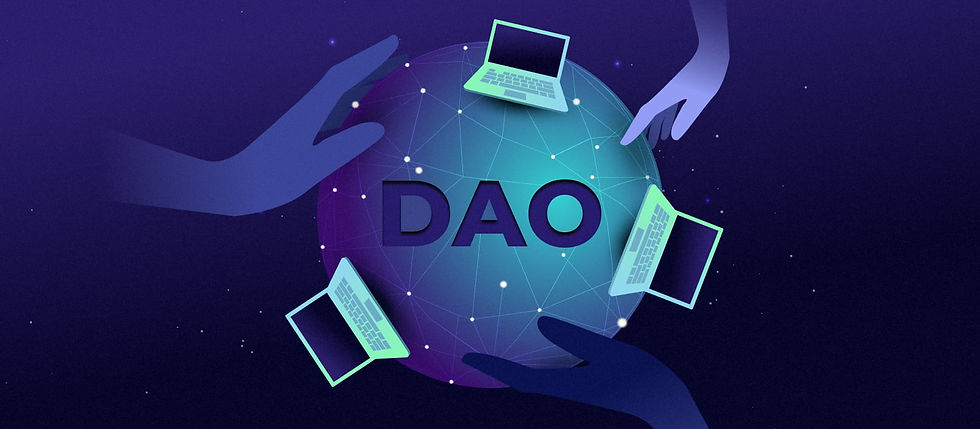Decentralized Autonomous Organizations (DAOs): Governance Models to Watch in 2025
- Bitcoinsguide.org

- Aug 24
- 3 min read
Understanding DAOs: The Next Step in Organizational Evolution
Decentralized Autonomous Organizations (DAOs) represent a paradigm shift in how communities, businesses, and projects govern themselves.
Unlike traditional centralized companies, DAOs operate through blockchain-based smart contracts that automate decision-making and enforce transparency, decentralization, and democratic participation.
DAOs empower token holders with voting rights, allowing collective control over protocols, treasury funds, and development roadmaps.
This new form of governance eliminates intermediaries, reduces bureaucracy, and aligns incentives in unprecedented ways.

Key DAO Governance Models to Watch in 2025
As DAOs evolve, several governance frameworks have emerged, each addressing different needs and challenges. Here are the most influential models to track:
1. Token-Based Voting
The most common DAO governance model allocates voting power proportional to the number of governance tokens held.
Popularized by protocols like MakerDAO and Compound, this system enables efficient on-chain decisions but risks concentration of power among large holders.
Pros:
Transparent and quantifiable voting weight
Incentivizes token holding and participation
Cons:
Vulnerable to whale dominance
Potential for voter apathy
2. Quadratic Voting
Quadratic voting aims to reduce plutocracy by weighting votes non-linearly — a voter’s influence grows with the square root of tokens held, encouraging broader participation.
This model has been explored by projects like Gitcoin Grants and MolochDAO.
Pros:
Encourages more egalitarian participation
Mitigates influence of whales
Cons:
More complex implementation
Risk of vote manipulation via coordinated attacks
3. Reputation-Based Governance
Instead of token holdings, voting power is based on a member’s contributions, expertise, or past participation.
This model is gaining traction in DAOs focused on research, development, or community building, where meritocracy is critical.
Pros:
Rewards active contributors
Reduces speculative token influence
Cons:
Difficult to quantify reputation fairly
Requires off-chain data oracles
4. Delegated Voting (Liquid Democracy)
Delegated voting allows members to transfer their voting rights to trusted delegates, blending direct and representative democracy.
This flexible system is employed by projects like Snapshot and Aragon, enhancing voter turnout and expertise in decisions.
Pros:
Increases voter engagement
Enables expert decision-making
Cons:
Potential centralization if delegation is abused
Requires voter education
5. Multisignature and Timelock Governance
Some DAOs incorporate multisig wallets and timelock contracts to add layers of security and delay execution, preventing rushed or malicious proposals.
This model is popular for treasury management and protocol upgrades.
Pros:
Enhances security and accountability
Provides time for community review
Cons:
Slows decision implementation
Can reduce agility
Challenges Facing DAO Governance in 2025
Despite rapid growth, DAOs face critical hurdles:
Low voter turnout: Many governance tokens remain inactive, diluting legitimacy.
Sybil attacks and manipulation: Malicious actors attempt to gain outsized influence.
Legal and regulatory uncertainty: Jurisdictions struggle to classify DAOs legally.
Scalability of decision-making: Larger DAOs face coordination and communication bottlenecks.
Solutions are emerging, such as identity verification (KYC), off-chain voting with on-chain execution, and hybrid governance models combining on- and off-chain elements.

The Future Impact of DAOs on Crypto Ecosystems
DAOs are poised to redefine:
DeFi protocols: Community-led treasury management and upgrades.
NFT communities: Collective ownership, curation, and funding of art projects.
Social media and content creation: Incentivized participation and moderation.
Investment DAOs: Pooled capital and democratic asset allocation.
Real-world applications: DAOs managing physical assets, charity funds, and even decentralized cities.
Their evolution will drive transparency, inclusivity, and innovation while challenging existing corporate and legal structures.
Conclusion: Why DAO Governance Models Matter
As DAOs mature in 2025, the governance models they adopt will determine their success or failure.
Investors, developers, and community members must understand these frameworks to engage effectively and influence future decentralized systems.
Decentralized governance is not just a technological trend—it’s a fundamental shift toward democratizing decision-making and redefining trust in the digital age.
Subscribe to bitcoinsguide.org for cutting-edge analysis, governance insights, and in-depth research on DAOs, DeFi, and Web3 innovation.



Comments